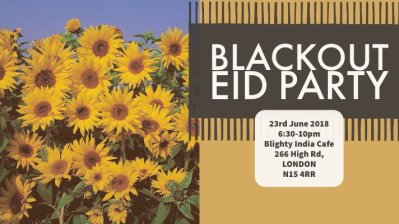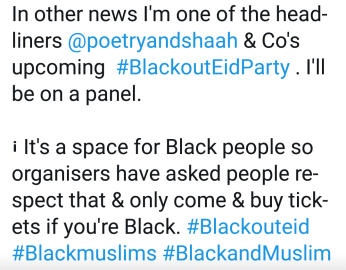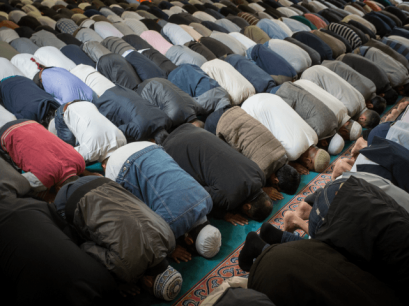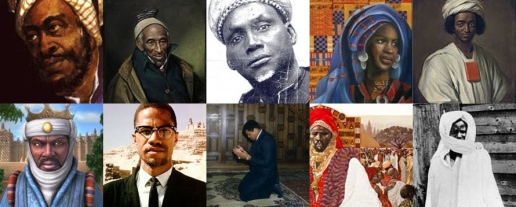In December 2016, after some controversial comments by a well-known Islamic scholar, I decided to write an article on the issue of racism and Islam.
Recently the debate around racism within the Muslim community has flared up once again and this is mainly down to a young speaker who is known in some circles and made some comments on a microphone and loud speaker in the streets of Birmingham. Most people will have come across them, I therefore wont go into the details except to say that they were both outrageous and extremely offensive. A snippet of the offending statement was then publicised by an individual on the Muslim comedy scene who rightly criticised this individual for his statement but unfortunately he also went into an insulting rant about Asians in general – which he is known to do on a regular basis.
Racism within the Muslim community in the UK is a hot topic. In Ramadan this year, an event was advertised and was titled: ‘Black Out Eid Party’. One of the speakers at the event who was promoting it ahead of it taking place a couple of weeks later tweeted a message which stated: “It’s a space for Black people so organisers have asked people respect that & only come & buy tickets if you’re Black.”


This understandably caused some heated discussion and debate. Although the organisers and supporters defended their right to hold such an event, many – including British Black Muslims, criticised the gathering particularly the enforcing a policy of excluding other Muslims based on the colour of their skin. Some also hypothetically challenged them and stated that such an event would have prohibited some of the Sahabah and the Prophet (peace be upon him) himself from being permitted entry.
For context and background, figures from the 2011 Census show the demographic of Muslims in the UK is made up as follows:
Asians: 1,830, 560 (68%)
Black/African/Caribbean: 272,015 (10%)
White: 210, 620 (7.8%)
Arab: 178, 195 (6.6%)
Other: 112, 094 (4.1%)
Mixed/Multiple Ethnic Group: 102, 582 (3.8%)
Rather than go over the debate on racism or repeat the issues raised in my previous article, I have decided to address some problems within the community and to also suggest some practical steps and solutions in trying to overcome them.
(Disclaimer: The suggestions are based on my opinions and observations. Some of them may seem obvious or cliché. There will be some that have been tried or discussed previously. The suggestions are not intended to offend, be patronising, belittle or point the finger. They are just some suggested solutions – as a side note I personally think we need to see more actual solutions being discussed for issues, whether its racism, gender or anything else when articles of this nature are written rather than just stating the problems themselves.)
Acknowledgement
Firstly, we need to acknowledge there are issues within the Muslim community. There is undoubtedly a % of the Asian community that hold racist/hostile/prejudice/discriminatory views and opinions towards the Black community. This has often been termed as Anti-Blackness.
Likewise, there is a % of the Black community that hold racist/hostile/prejudice/discriminatory views and opinions towards Asian or Arab Muslims. You could describe this as Anti-Browness or Anti Non-Blackness.
We also have the often ignored and under-highlighted issue of racism and hostility towards White people or White Muslims. This is often seen as banter, funny or White people being fair game. We should be in no uncertain terms understand that as Muslims, this is prohibited under Islam and is it also hypocritical of Muslims who complain about other types of racism but then somehow think this is acceptable or OK.
Underrepresentation
There is a clear underrepresentation of Black Muslims both in leadership positions within Mosques and organisations as well as on panels at Muslim events. Mosques and organisations, especially those that have a very closed circle of management and leaders, need to create mechanisms and channels that allow for opportunities for those of different ethnic backgrounds, age groups, females and other groups to participate in the running of those institutions or at least have their views and experiences represented.
There also needs to a push from individuals to put themselves forward for both speaking at events and in the running of organisations.
Organisations
The vast majority of Muslim events that take place, often seem to have all-male and/or all-Asian (or Arab) panellists. Whilst this situation may be perfectly fine in some instances or due to some circumstances, it certainly should not be the default for every event your organisation arranges. If you are part of an organisation and your key events repeatedly seem to have this set-up, then this is something that needs to be addressed. Organisations that run big conferences, charity dinners or Ramadan iftar events need to actively seek speakers from a diverse background.
Away from key positions, the demographic of volunteers for most organisations almost always appear to be 80-90% (or more) from Asian or Arab backgrounds. This is certainly the case for most of the organisations I know. Almost every Muslim organisation actively seeks volunteers and therefore more Black Muslims and Muslims of other backgrounds need to contact good organisations like CAGE, MEND, MPAC, NZF and the various Islamic charities to offer your services for activities such as volunteering at events, getting involved in fundraising, writing articles and in general offering your free time to aid their work.
Organisations also need to branch out into different geographical areas and regions. The more you stick to holding events and workshops in one area, the less diverse and limited your audience will be. We need to move away from some organisations for example, only serving East London. If your resources limit you and you cannot hold events outside of London, then regularly rotate and have events in West London, South London etc where you will likely get different types of audiences from different backgrounds.
Mosques
As mosques are often the centre and hub of a Muslim community, they play a vital role in cohesion, inclusion and harmony amongst different groups of Muslims.
Mosques need to be encouraged to hold their talks, events and sermons in English as it is a more universal language that everyone can (or should) understand in the UK. I have sat in Jummah and also on Eid on many occasions at different mosques, where the Imam is speaking in Urdu, Bengali or other languages and I have felt very awkward when I have seen brothers around me who are Black or White, often Reverts, sitting through a sermon where they do not understand what is being said. I had this experience personally in the US many years ago on Eid. I found a place that was holding Eid Salah and I turned up expecting to hear a sermon in a Californian accent only to sit through 45 minutes of a language (not Arabic) where I couldn’t understand a word. Apart from the actual prayer, it almost didn’t feel like Eid for that hour. My extra Eid takbirs and movements were all out of sync and the choreography was terrible as I couldn’t catch the instructions from the Imam like I normally would back in the UK!

On the one hand, in theory it might be understandable where a Mosque may be in a predominantly Pakistani/Somali/Turkish etc area and therefore the Imam or management of that Mosque may want to cater for the majority of the attendees, however you will be excluding a % of the audience, even if it just a minority of people. I would also argue that most people in this country can speak English, at least to a basic level and therefore we wouldn’t be excluding anyone by speaking in a more commonly understood language like English.
There are some known Pakistani Mosques, Bengali or Nigerian Mosques and so forth. Congregations at such Mosques need to be more welcoming to those that attend that may not be from the same ethnic background. Even a simple Salaam or smile can go a long way. Also, let’s not try to have 400 people stare at someone with the ‘Who is this guy/What is he doing here?’ look on our faces when they walk in – it must be a little intimidating! They have come to worship the same God as you and utter the same words in prayer as you. Let us see them as our equal brother in faith and not an alien from outer space!
Similarly, and although this may not strictly be the remits of Mosques I do find it quite disturbing and abhorrent when I hear of things like Gujrati cemeteries (i.e. you can only be buried there if you are from a Gujrati background) and other restricted burial grounds based on ethnicity or where your parents were born or came from. Even in death and when we are buried under ground, there seems to be a practice of separating us and dividing the community.
Back to Mosques, when a congregational dua (supplication) or appeal is taking place, let us not always just do it for Gaza, Syria or Pakistan. We are a global Ummah made up from different ethnic groups, tribes and from all corners of the Earth. We need to regularly pray for and highlight the situations and plight of Muslims across the World including Somalia, China, Central African Republic, Afghanistan, Sudan, Chechnya and where ever we hear the cries of our brothers and sisters and of our mothers and fathers.
Knowledge
THERE IS NO ‘BLACK CONTRIBUTION TO ISLAM’. We don’t talk about the Arab or Brown contribution to Islam. We need to stop talking about things as though it is surprising from a 1400-year history and hundreds of millions of Black Muslims during that time that great things, breakthroughs and achievements were unexpected. These accomplishments are not favours or ad-hoc activities carried out by some external of foreign entity. Black people are not honorary members of the Ummah or just ‘part’ of the Ummah, they are the Ummah.
We need to expand our knowledge of historical Muslims who were black, beyond Bilal (ra). Whilst he was a crucial figure in early Islamic history and famously the first Mu’azzin (caller to prayer), we cannot have just one name we use again and again as an example in our discussions. (I wrote an article on historical Muslim figures who were Black to give you a few additional names we should all be familiar with)

It has been great to see more Muslim organisations hold events around Black History Month. It is something we saw very little of 5 or 10 years ago. However, we shouldn’t tokenise such events or limit them to one month of the year. Why only talk about Bilal (ra) or Muhammad Ali (rh) at one time in the year and not for the other 11 months? We do not do this to other Sahabi or historical figures.
Parents and Families
If we hear our parents, siblings or anyone else we know, make racist jokes about other ethnic groups or repeating stereotypes or myths about other groups – then challenge it. Even if it is something you have heard from them before but didn’t say anything, or perhaps you ignored at or let slide, it is something we need to put and end to and to openly say it is not acceptable. It may be something they heard from their parents or siblings, who may have heard it from their parents and siblings and so forth, but we can put a stop to it and educate those around us. Maybe by doing this, we not only make it socially unacceptable to have such things being said it also means it won’t be passed down to the next and future generations.
It doesn’t even need to be just limited to other races, even if we hear things said regarding different Asian groups such as Pakistanis looking down on Bengalis (and vice versa) or between Somalis and Kenyans.
Sometimes what we hear in our families or joke about is subtle, such as someone being too dark, or conversely praising someone for being light skinned as if it is some kind of achievement. (This is known to happen in many Asian and Black families). As well as being emotionally and psychologically damaging, such statements and ideas often develop into bigger and more open forms of racism, discrimination and they often fuel our unconscious bias which has an impact on people we meet later in life. This is something we should also call out when and where we hear it.
For parents, if your son or daughter mentions someone they are considering for marriage, judge that person on their taqwa, piety and character, not on their village, caste or colour. Although there is nothing wrong or racist in wanting to marry someone from a similar culture or from the same race, or to have a preference – that’s for the person looking to get married to decide, not you! Scholars have said it is impermissible to reject a marriage proposal in your family based on racial or ethnic grounds and it is also haram to force or pressure your children into marrying someone they do not want. Many scholars have actually said if this occurs, the Nikah is in fact invalid.
Individuals
As individuals, we ALL have a duty to be careful and considerate with our language and terminology when speaking about each other. It is from the Islamic etiquette and adhab to speak to and about one another in a pleasant way and in terms that are endearing and express our unity amongst us. Therefore, terms such as ‘Desi Muslims’ (which almost no Asians use to describe themselves or like using) or NBPOC (Non-Black Person Of Colour) are not the best way of achieving the above. Worst still, as Muslims we should not use terms such as Kalah (Black person), Gorah (White person) – both which are often used in a negative context, and particularly extremely offensive words such as P**i or N***er to describe people of another race.
Neither should we be using nor encouraging the use of idiotic terms like Banu Ganesh and Abu Vishnu which some ‘comedian’ uses to describe Muslims with Asian ethnicity. (Both terms refer to being descendants of Hindu Gods). I doubt whether any Muslim would have ever dared to refer to a Sahabi as Banu Hubal or Abu Manat.
We should also extinguish our calls for unity or solutions based on Nationalistic, tribal or ethnic grounds. These are all divisive and not from Islam. Let us unite upon Haqq and not Baatil and upon Islamic principles and concepts not un-Islamic ones.
It is right to highlight existing issues of racism, underrepresentation or exclusion within our mosques, organisations and events. But let us not duplicate these problems and then recreate them elsewhere. It is not solving the issue but creating another version of the institutions with the same problems. The mosque or organisation we complained about will still exist and the exclusion and underrepresentation with still occur – so what has been resolved? In fact, we are being hypocritical in complaining about something when in fact we intend to replicate something that will inevitably exclude other people or put them in the same situation we once complained about.
My final suggestion is we need to condemn racism/discrimination/hostility from whoever the perpetrator is (whether they are White, Black, Asian or other) and regardless of who the victim or person on the receiving end is (whether they are White, Black, Asian or other).
I end with some words from an example to mankind and the greatest and most perfect human being to ever walk the face of the Earth:
“…a white has no superiority over black nor a black has any superiority over white except by piety and good action.”
“The Believers, in their mutual love, mercy and compassion, are like one body: if one organ complained, the rest of the body develops a fever.”
“Verily, there is no good in red skin or black skin, but rather only by virtue of righteousness”

1. I think perhaps Muslims ought to have their own conceptualisations of key terms in analysing these social issues. We can even dispute the word “racism”, for a start. What is it’s Arabic equivalent? ‘Ansuriyya’ – that would be a translation of the English word, so it appears. The Prophet – peace be upon him – described the behaviour of Abu Dharr towards Bilal – may Allah be pleased with both of them – as ‘jahiliyyah’. I have understood that as Muslims we should stick as closely to the wording of the Revelation as possible unless for a necessity, hence the terminologies we use for Islamic sciences, which still have a root in revelation. There are terms, like knowledge, wisdom, dignity and so on, which are invoked by Revelation as already being understood by the audience it addresses. Perhaps we ought to use a pre-modern term to describe the phenomena of “racism”. I am not unsympathetic with terms and ideas used in critical race theory, but they don’t settle comfortably within me (“Wrong is what feels awkward inside…” الإثم ما حاك في صدرك)
2. You assume an equal weighting of “racist” behavior between different groups. Ignorant, bad behavior by black people towards white people is not of the same consequence of white people with shared biases in power influencing the life chances of black people. “White privilege” doesn’t mean white people live in luxury; it means white people don’t experience “racism” if we take “racism” to mean prejudice plus power.
LikeLike
“Ignorant, bad behavior by black people towards white people is not of the same consequence of white people with shared biases in power influencing the life chances of black people. ”
This statement is totally based upon stereotypes. This is so wrong. There are many times where white people are dis-empowered victims of non-white racism. I know because I have been there.
“White privilege” doesn’t mean white people live in luxury; it means white people don’t experience “racism” if we take “racism” to mean prejudice plus power.”
This is wrong too. It is also based upon gross generalizations. I don’t know a more oppressed, harassed and generally isolated group of people in Europe or America than identifiable, white working class male Muslims.
LikeLike
This is so true. It’s something I talk about all the time with family and friends. It’s honestly a big problem and people don’t like talking about it. Not only do I see racism and ignorance towards black people, I see it towards darker skinned people of the SAME race! And when you call them out, they deny it. Anyway this is a great post!
LikeLiked by 1 person
“It’s a space for Black people so organisers have asked people respect that & only come & buy tickets if you’re Black.”
This is pure Jahiliyyah : (
We are all Bani Adam (as)
LikeLike
Reblogged this on patricknelson750 and commented:
A very worthwhile and perceptive post indeed.
LikeLike